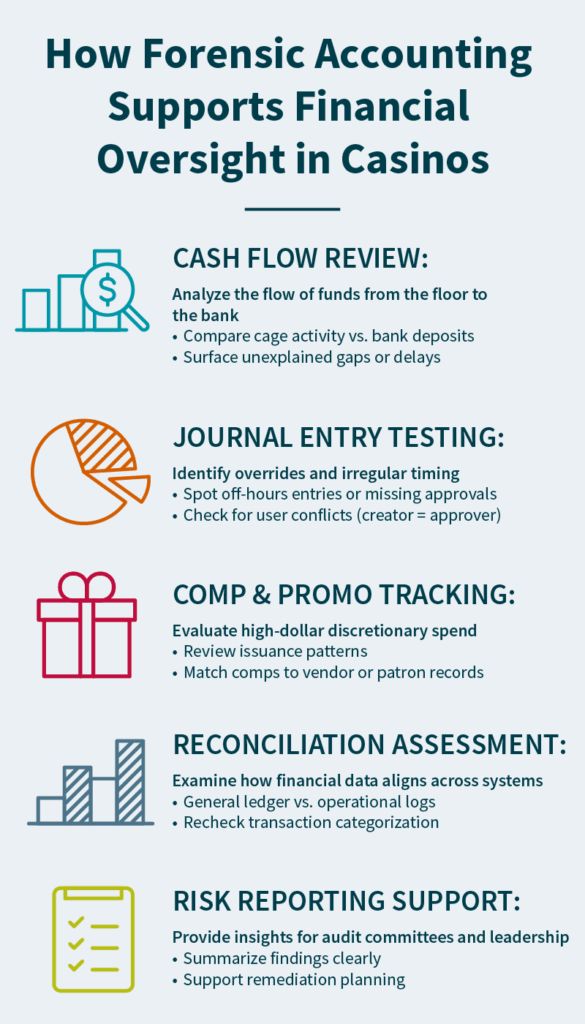- in United States
- within Government, Public Sector, Criminal Law and Real Estate and Construction topic(s)
- with readers working within the Accounting & Consultancy industries
Key Takeaways:
- Anti-money laundering exposure in casinos often stems from breakdowns in reconciliation, reporting, or oversight — not just suspicious patrons.
- Forensic accounting helps uncover transaction anomalies that may show internal control gaps.
- Casinos can benefit from a proactive approach to finding financial red flags tied to high-risk cash activity.
Casinos and Tribal gaming enterprises are no strangers to regulatory pressure when it comes to anti-money laundering (AML) compliance. But while legal teams and compliance officers handle the regulatory mechanics, financial oversight teams often play a crucial — if indirect — role in detecting the earliest signs of potential AML risk.
This is where forensic accounting becomes especially valuable. By analyzing unusual transaction flows, deposit patterns, or internal approval irregularities, forensic specialists can help your casino surface issues that, if left unaddressed, may evolve into AML exposure.
Not All Red Flags Come from Patrons
Much of AML focus centers on patron behavior — structuring, chip walking, or unusual betting volumes. But financial anomalies behind the scenes can be just as telling.
For example:
- Gaps between reported cash receipts and actual bank deposits
- High-volume promotional comps issued without consistent approval
- Unexplained manual overrides in journal entries
- Deposit delays that don't align with cage activity
These issues might not stem from criminal intent, but they often point to control weaknesses that increase risk — especially under AML scrutiny.
Why Forensic Accounting Matters
A skilled forensic team can dive into transactional data to trace how cash flows through your organization — from table to cage to general ledger. This type of analysis helps answer key questions like:
- Are high-value comps or credits being issued outside standard processes?
- Are there timing patterns in deposits that don't align with operational activity?
- Is there evidence of manual adjustments that bypass oversight?
While this doesn't replace a formal AML program, it directly supports your casino's ability to identify risks before they escalate — and equips leadership with data to take corrective action.
Case Example: Pit-Cage Mismatch
One Tribal casino flagged a pattern of recurring discrepancies between table game cash reports and deposits reaching the bank. No fraud was suspected, but the forensic review uncovered process inconsistencies between the pit and the cage — as well as late reconciliations across multiple shifts.
The result? Revised reporting procedures, clearer separation of duties, and a more consistent audit trail — all of which contributed to stronger overall financial oversight.
Strengthening Oversight Through Forensic Review
Firms with experience in forensic accounting and regulated industries can provide valuable support when financial red flags appear. At MGO, our team works with casino operators and Tribal enterprises to help review cash flow activity, show anomalies, and bring greater clarity to complex financial data.
Whether you're responding to unusual transaction patterns or looking to enhance internal oversight, forensic analysis can offer a clearer understanding of where control gaps may exist — and how to prioritize corrective actions. Reach out to our team today to find out how our forensic accounting services can strengthen your financial oversight.

The content of this article is intended to provide a general guide to the subject matter. Specialist advice should be sought about your specific circumstances.
[View Source]

